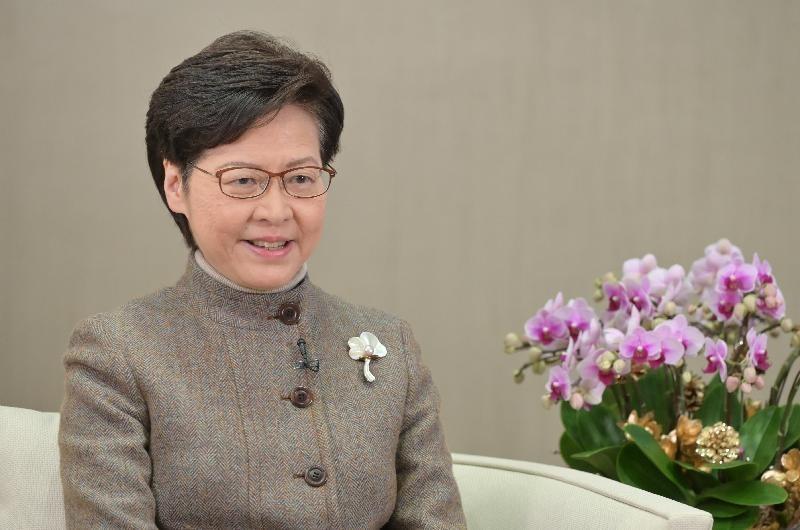 Hong Kong Chief Executive Carrie Lam Cheng Yuet-ngor delivers a video speech at the 14th Asian Financial Forum on Jan 18, 2021. (PHOTO / HKSAR GOVERNMENT)
Hong Kong Chief Executive Carrie Lam Cheng Yuet-ngor delivers a video speech at the 14th Asian Financial Forum on Jan 18, 2021. (PHOTO / HKSAR GOVERNMENT)
As the Chinese mainland was the world’s only major economy to grow in a turbulent 2020, Hong Kong, capitalizing on its “strong fundamentals and unique advantages as the international financial center of the country and one of the world’s major financial hubs”, is betting big on a world of opportunities in the post-pandemic era, Hong Kong Chief Executive Carrie Lam Cheng Yuet-ngor said on Monday.
Citing a Chinese saying that when there are risks, there are opportunities, Lam told the 14th Asia Financial Forum, which for the first time takes place virtually this year, that “there will be a real momentum for recovery in the second half of the year” if the vaccines are as successful as people expect.
Last year, the Chinese mainland’s economy, the world’s second largest, expanded by 2.3 percent, according to data released by the National Bureau of Statistics on Monday as the country’s economic output climbed above the 100 trillion-yuan (US$15.4 trillion) milestone for the first time.
The results topped expectations. In a report released in early January, the International Monetary Fund forecast the nation’s gross GDP would rally at approximately 2 percent in 2020, while the GDP of developed economies as well as emerging and developing economies could plunge by 5.4 percent and 2.6 percent, respectively. The economic output of the United States is predicted to contract by 3.6 percent in 2020.
Gross domestic product advanced 6.5 percent in the final quarter from a year earlier, fueled by stronger-than-expected industrial output, the statistics bureau said Monday. This also beat the expectations of analysts surveyed by Bloomberg who had predicted 6.2 percent growth for the quarter and 2.1 percent for the full year.
Hong Kong, Lam pointed out, has also cemented its position as the world’s largest offshore renminbi business hub. In 2019, about 75 percent of the global offshore renminbi payments were processed through Hong Kong. Total renminbi deposits at the end of October 2020 exceeded 721 billion yuan
ALSO READ: Lam says central govt firmly supports the SAR
Economists expect the nation’s GDP to gain steam this year with an estimated growth of 8.2 percent, continuing to outpace global peers including the United States.
Based on projections from the IMF, China remains on course to overtake the US as the world’s largest economy by 2028, two years earlier than previously predicted, according to Nomura.
Lam has high hopes on the widespread use of vaccines and the Chinese mainland’s economic ascent to accelerate the global recovery. Last year, the global economy plunged roughly 4.4 percent, while Hong Kong’s GDP is expected to decline by 6.1 percent.
“Amidst the challenges, Hong Kong’s financial system has demonstrated its strengths and resilience. Our financial markets continue to operate orderly, and that includes the Linked Exchange Rate System. The Hong Kong dollar to the US dollar exchange rate has stayed on the strong side, reflecting investors’ continuing confidence in our financial markets,” Lam said in the opening speech.
Since 2009, the city has been ranked number one for IPO funds raised seven times, Lam noted. The pandemic-ravaged year of 2020 did not stop companies from tapping the Hong Kong stock market for fundraising, either. Blockbuster deals from promising mainland companies pushed the city’s IPO fundraising to a 10-year high in 2020 at US$50.8 billion, as data from Refinitiv showed.
The city, Lam pointed out, has also cemented its position as the world’s largest offshore renminbi business hub. In 2019, about 75 percent of the global offshore renminbi payments were processed through Hong Kong. Total renminbi deposits at the end of October 2020 exceeded 721 billion yuan.
READ MORE: Experts call for legal talent training for Bay Area development
“Thanks to our “One Country, Two Systems” framework and long-standing advantages, including an internationally aligned regulatory regime, the rule of law, a simple and low tax system and the free flow of information and capital,” the Hong Kong leader stressed, “We continue to be an ideal gateway between the mainland and the rest of the world. That very much includes our role as both a conduit for foreign capital investing in the mainland and the springboard for mainland companies looking to international markets.”
Lam has set her sights on the Guangdong-Hong Kong-Macao Greater Bay Area, an emerging cluster-city development integrating more than 72 million people and a combined GDP of US$1.7 trillion that could spell potentially golden opportunities for those with the foresight to jump on the bandwagon.
She highlighted the Wealth Management Connect, the latest offering that will allow Bay Area residents to carry out cross-boundary investments in wealth-management products distributed by banks in the area. At the end of 2019, assets under management in Hong Kong totaled US$3.7 trillion, 64 percent of that sourced from non-local investors.
“The initiative will further strengthen Hong Kong’s asset and wealth management sector and showcases Hong Kong’s high degree of internationalization as a leading asset and wealth management hub,” Lam added.


